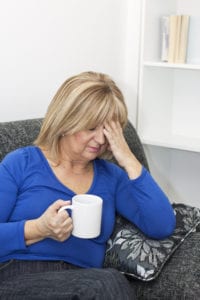Written by Tatjana Djakovic, Staff Writer. Of the participating postmenopausal women, those who supplemented with 530 mg of valerian twice daily for two months had a significant reduction in severity of symptoms at the end of one and two months of treatment .
 Hot flashes, one of the most commonly reported symptoms of menopausal women, are due to fluctuating levels of the hormone estrogen 1. Lifestyle factors such as smoking, obesity, tubal ligation and race/ethnicity 2 all contribute to their severity. A large women’s study on the risks and benefits of estrogen therapy has shown an increased risk of heart disease and mortality with hormone replacement therapy; 3 therefore, women would benefit significantly from a potentially safer alternative treatment for the relief of hot flashes. Valerian root, is an herbal supplement that has been used to alleviate symptoms such as: anxiety, depression, stress, headaches and menopausal symptoms 4. Since very little research has been done on Valerian’s ability to alleviate menopausal symptoms, researchers conducted the following triple-blind, randomized, controlled clinical trial (5) to test its effectiveness on hot flash symptoms and severity.
Hot flashes, one of the most commonly reported symptoms of menopausal women, are due to fluctuating levels of the hormone estrogen 1. Lifestyle factors such as smoking, obesity, tubal ligation and race/ethnicity 2 all contribute to their severity. A large women’s study on the risks and benefits of estrogen therapy has shown an increased risk of heart disease and mortality with hormone replacement therapy; 3 therefore, women would benefit significantly from a potentially safer alternative treatment for the relief of hot flashes. Valerian root, is an herbal supplement that has been used to alleviate symptoms such as: anxiety, depression, stress, headaches and menopausal symptoms 4. Since very little research has been done on Valerian’s ability to alleviate menopausal symptoms, researchers conducted the following triple-blind, randomized, controlled clinical trial (5) to test its effectiveness on hot flash symptoms and severity.
The Iranian study consisted of 60 postmenopausal women, aged 45-55 years, 5 who were not on hormonal, herbal or relaxation therapies, were non-smokers, and had no physical or mental diseases. The participants were randomized to two groups: an intervention group receiving 530mg capsules of Valerian twice daily or placebo group receiving 530 mg of starch for two months. The severity and frequency of symptoms were assessed using the Kupperman index 6 at the beginning of the study, one month after starting the intervention and at the end of 2 months.
- After one month of valerian supplementation, hot flash severity was significantly lower in the valerian group (P=0.048) compared to the placebo group.
- Hot flash severity was also significantly lower at the end of the two month valerian supplementation (p=0.020) compared to placebo.
- The mean frequency of hot flashes was significantly reduced after two months of valerian use (P= 0.033) but not significant after one month of use (P=0.15)
- No participants had nay side effects from valerian use.
The results of the present study show that valerian root may reduce hot flashes during menopause; however, the study is not without limitations. The women were chosen from two health centers in Iran and are therefore not a representative sample of all menopausal women. In addition, the sample size was small which could have resulted in statistical variance. Furthermore, the study did not use a standard questionnaire for measuring the severity and frequency of hot flashes. Nonetheless, the study leads the way for larger more representative studies to show the effectiveness of valerian root in reducing severity and frequency of hot flashes in menopausal women.
Source: Jenabi, Ensiyeh, Fatemeh Shobeiri, Seyyed Mohammad Mahdi Hazavehei, and Ghodratollah Roshanaei. “The effect of Valerian on the severity and frequency of hot flashes: A triple-blind randomized clinical trial.” Women & Health (2017): 1-8.
© 2017 Taylor & Francison the risks and benefits of estrogen therapy
Posted August 14, 2017.
Tatjana Djakovic, MS, graduated from Roosevelt College in 2011, with concentration in biochemistry. Her research was in determining antioxidants and macronutrients in herbal teas. She is originally from Gospic, Croatia and currently resides in Carol Stream, IL.
References:
- Tan MN, Kartal M, Guldal D. The effect of physical activity and body mass index on menopausal symptoms in Turkish women: a cross-sectional study in primary care. BMC women’s health. 2014;14(1):38.
- Freeman E, Sherif K. Prevalence of hot flushes and night sweats around the world: a systematic review. Climacteric. 2007;10(3):197-214.
- Investigators WGftWsHI. Risks and benefits of estrogen plus progestin in healthy postmenopausal women: principal results From the Women’s Health Initiative randomized controlled trial. Jama. 2002;288(3):321-333.
- Morris CA, Avorn J. Internet marketing of herbal products. Jama. 2003;290(11):1505-1509.
- Jenabi E, Shobeiri F, Hazavehei SMM, Roshanaei G. The effect of Valerian on the severity and frequency of hot flashes: A triple-blind randomized clinical trial. Women & Health. 2017:1-8.
- Schneider H, Heinemann L, Rosemeier H-P, Potthoff P, Behre H. The Menopause Rating Scale (MRS): comparison with Kupperman index and quality-of-life scale SF-36. Climacteric. 2000;3(1):50-58.
